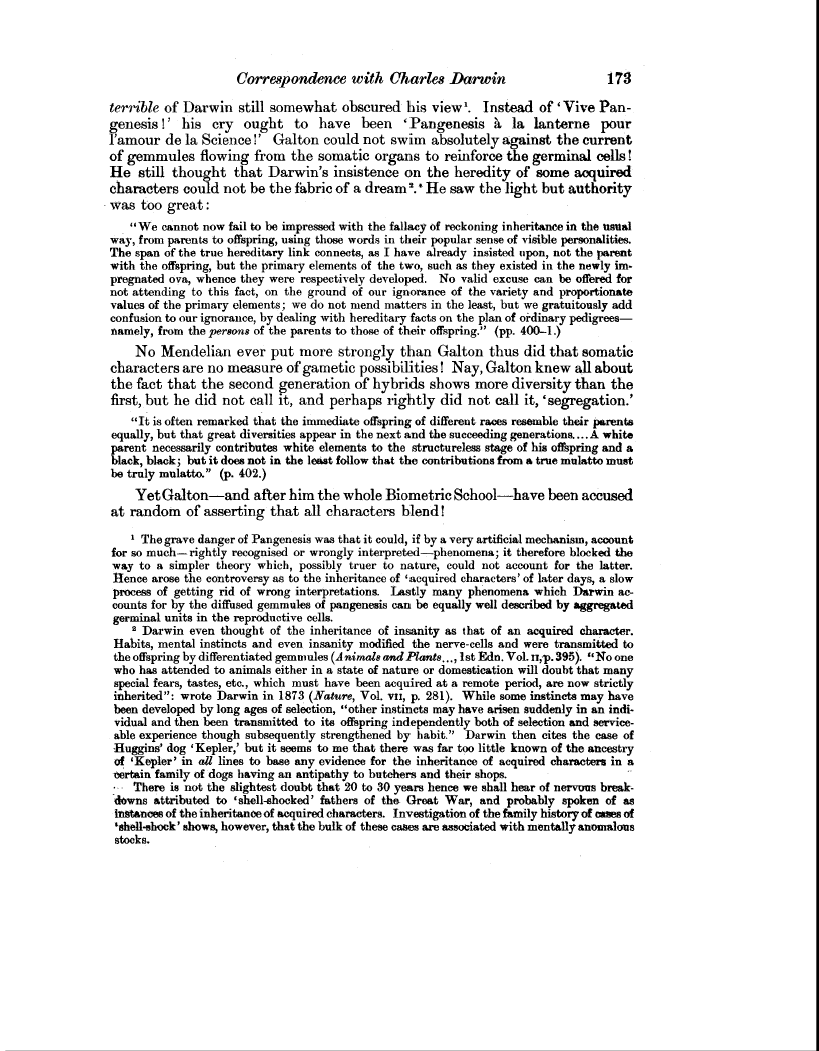Correspondence with Charles Darwin 173
terrible of Darwin still somewhat obscured his view'. Instead of ' Vive Pangenesis !' his cry ought to have been `Pangenesis a la lanterne pour 1'amour de la Science!' Galton could not swim absolutely against the current of gemmules flowing from the somatic organs to reinforce the germinal cells ! He still thought that Darwin's insistence on the heredity of some acquired characters could not be the fabric of a dream s.' He saw the light but authority was too great
"We cannot now fail to be impressed with the fallacy of reckoning inheritance in the usual way, from parents to offspring, using those words in their popular sense of visible personalities. The span of the true hereditary link connects, as I have already insisted upon, not the parent with the offspring, but the primary elements of the two, such as they existed in the newly impregnated ova, whence they were respectively developed. No valid excuse can be offered for not attending to this fact, on the ground of our ignorance of the variety and proportionate values of the primary elements; we do not mend matters in the least, but we gratuitously add confusion to our ignorance, by dealing with hereditary facts on the plan of ordinary pedigreesnamely, from the persons of the parents to those of their offspring." (pp. 400-1.)
No Mendelian ever put more strongly than Galton thus did that somatic characters are no measure of gametic possibilities ! Nay, Galton knew all about the fact that the second generation of hybrids shows more diversity than the first, but he did not call it, and perhaps rightly did not call it, `segregation.'
"It is often remarked that the immediate offspring of different races resemble their parents equally, but that great diversities appear in the next and the succeeding generations.... A white parent necessarily contributes white elements to the structureless stage of his offspring and a black, black; but it does not in the least follow that the contributions from a true mulatto must be truly mulatto." (p. 402.)
YetGalton--and after him the whole Biometric School-have been accused at random of asserting that all characters blend !
I The grave danger of Pangenesis was that it could, if by a very artificial mechanism, account for so much- rightly recognised or wrongly interpreted-phenomena; it therefore blocked the way to a simpler theory which, possibly truer to nature, could not account for the latter. Hence arose the controversy as to the inheritance of 'acquired characters' of later days, a slow process of getting rid of wrong interpretations. Lastly many phenomena which Darwin accounts for by the diffused gemmules of pangenesis can be equally well described by aggregated germinal units in the reproductive cells.
2 Darwin even thought of the inheritance of insanity as that of an acquired character. Habits, mental instincts and even insanity modified the nerve-cells and were transmitted to the offspring by differentiated gemmules (Animals and Plants..., 1st Edn. Vol. u,p.395). "No one who has attended to animals either in a state of nature or domestication will doubt that many special fears, tastes, etc., which must have been acquired at a remote period, are now strictly inherited": wrote Darwin in 1873 (Nature, Vol. vii, p. 281). While some instincts may have been developed by long ages of selection, "other instincts may have arisen suddenly in an individual and then been transmitted to its offspring independently both of selection and serviceable experience though subsequently strengthened by habit." Darwin then cites the case of Huggins' dog ' Kepler,' but it seems to me that there was far too little known of the ancestry of 'Kepler' in all lines to base any evidence for the inheritance of acquired characters in a certain family of dogs having an antipathy to butchers and their shops.
- There is not the slightest doubt that 20 to 30 years hence we shall hear of nervous breakdowns attributed to 'shell-shocked' fathers of the Great War, and probably spoken of as instances of the inheritance of acquired characters. Investigation of the family history of cases of `shell-shock' shows, however, that the bulk of these cases are associated with mentally anomalous stocks.

